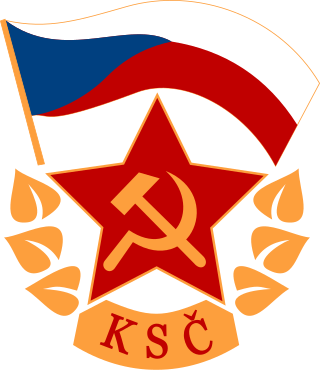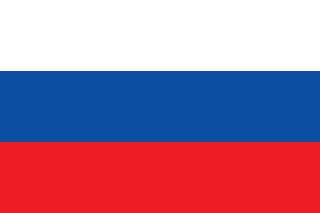
The Communist Party of Czechoslovakia was a communist and Marxist–Leninist political party in Czechoslovakia that existed between 1921 and 1992. It was a member of the Comintern. Between 1929 and 1953, it was led by Klement Gottwald. The KSČ was the sole governing party in the Czechoslovak Socialist Republic though it was a leading party along with the Slovak branch and four other legally permitted non-communist parties. After its election victory in 1946, it seized power in the 1948 Czechoslovak coup d'état and established a one-party state allied with the Soviet Union. Nationalization of virtually all private enterprises followed, and a command economy was implemented.
The government of Czechoslovakia under Marxism–Leninism was in theory a dictatorship of the proletariat. In practice, it was a one-party dictatorship run by the Communist Party of Czechoslovakia, the KSC.

The Czechoslovak Socialist Republic, known from 1948 to 1960 as the Czechoslovak Republic, Fourth Czechoslovak Republic, or simply Czechoslovakia, was the Czechoslovak state from 1948 until 1989, when the country was under communist rule, and was regarded as a satellite state in the Soviet sphere of interest.

The Slovak Socialist Republic was from 1969 to 1990 a republic within the Czechoslovak Socialist Republic, when previously unitary Czechoslovak state changed into a federation. The name was used from 1 January 1969 until November 1989. The Slovak Republic was from 1990 to 1992 a republic within the Czech and Slovak Federative Republic, that is now the independent Slovakia.

The Federal Assembly was the highest organ of state power of Czechoslovakia from 1 January 1969 until the amendment of the state constitution on 23 April 1990. From 23 April 1990 until the dissolution of Czechoslovakia on 31 December 1992, it functioned as the state's federal legislature.
Parliamentary elections were held in Czechoslovakia on 26 May 1946. The Communist Party of Czechoslovakia emerged as the largest party, winning 114 of the 300 seats with 38% of the vote. The Communist vote share was higher than any party had ever achieved in a Czechoslovak parliamentary election; previously, no party had ever won more than 25%. Voter turnout was 94%. The national results also determined the composition of the Slovak National Council and local committees.

Parliamentary elections were held in Hungary on 25 March 1990, with a second round of voting taking place in all but five single member constituencies on 8 April. They were the first completely free and competitive elections to be held in the country since 1945, and only the second completely free elections with universal suffrage in the country's history. The conservative, nationalist Hungarian Democratic Forum (MDF) beat the liberal and more internationalist Alliance of Free Democrats, which had spearheaded opposition to Communist rule in 1989, to become the largest party in parliament. The Hungarian Socialist Party, the former Communist party, suffered a crushing defeat, winning only 33 seats for fourth place.

Parliamentary elections were held in Czechoslovakia on 27 October 1929. The Republican Party of Farmers and Peasants, emerged as the largest party, winning 46 seats in the Chamber of Deputies and 24 seats in the Senate. Voter turnout was 90.2% in the Chamber election and 78.8% for the Senate. The rightward shift of the 1925 elections was reversed, with moderate centre-left groups increasing their vote shares whilst the Communist Party suffered a set-back.

Federal elections were held in Czechoslovakia on 8 and 9 June 1990, alongside elections for the Czech and Slovak Assemblies. They were the first elections held in the country since the Velvet Revolution seven months earlier. Voter turnout was 96.2%.

Federal elections were held in Czechoslovakia on 5 and 6 June 1992, alongside elections for the Czech and Slovak Assemblies. The result was a victory for the Civic Democratic Party–Christian Democratic Party (ODS-KDS) alliance, which won 48 of the 150 seats in the House of the People and 37 of the 150 seats in the House of Nations. Voter turnout was 84.7%.

Parliamentary elections were held in Czechoslovakia on 22 and 23 October 1976. The National Front put forward a single list of candidates for both the House of the People and the House of Nations and one NF candidate ran in each single member constituency. With a total of 350 seats in the two Houses, 237 were assigned to the Communist Party of Czechoslovakia, 18 to the Czechoslovak People's Party, 17 to the Czechoslovak Socialist Party, four to the Party of Slovak Revival and 74 to others. Voter turnout was reported to be 99.7%.

Parliamentary elections were held in Czechoslovakia on 5 and 6 June 1981. The National Front put forward a single list of candidates for both the House of the People and the House of Nations and one NF candidate ran in each single member constituency. With a total of 350 seats in the two Houses, 240 were assigned to the Communist Party of Czechoslovakia, 18 to the Czechoslovak People's Party, 18 to the Czechoslovak Socialist Party, four to the Party of Slovak Revival, four to the Freedom Party and 66 to independents. Voter turnout was reported to be 99.51%.

Parliamentary elections were held in Czechoslovakia on 23 and 24 May 1986. The National Front put forward a single list of candidates for both the House of the People and the House of Nations and one NF candidate ran in each single member constituency. With a total of 350 seats in the two Houses, 242 were assigned to the Communist Party of Czechoslovakia, 18 to the Czechoslovak People's Party, 18 to the Czechoslovak Socialist Party, four to the Party of Slovak Revival, four to the Freedom Party and 64 to independents. Voter turnout was reported to be 99.39%.

Parliamentary elections were held in Hungary on 8 June 1985. The Patriotic People's Front, dominated by the Communist Hungarian Socialist Workers' Party, was the only organisation allowed to contest the election. All prospective candidates had to accept the Front's program in order to be eligible.
Parliamentary elections were held in Romania on 2 March 1969. The Front of Socialist Unity (FUS), which had been formed a year earlier to replace the People's Democratic Front (FDP), was the only organization that contested the election; no prospective candidate could run for office without the Front's prior approval. Like the People's Democratic Front, the Front of Socialist Unity was dominated by the Romanian Communist Party (PCR). The Front won all 465 seats in the Great National Assembly.
Parliamentary elections were held in Romania on 9 March 1975. The Front of Socialist Unity (FUS), dominated by the Romanian Communist Party (PCR) and including other mass organisations, was the only organisation that contested the election. No prospective candidate could run for office without the Front's prior approval. The Front won all 349 seats in the Great National Assembly.
Parliamentary elections were held in Romania on 9 March 1980. The Front of Socialist Unity and Democracy (FDUS), dominated by the Romanian Communist Party (PCR) and including other mass organisations, was the only organisation that contested the election. No prospective candidate could run for office without the Front's prior approval. The Front won all 369 seats in the Great National Assembly.

Parliamentary elections were held in Czechoslovakia on 30 May 1948. They were the first elections held under Communist rule; the Communist Party of Czechoslovakia (KSČ) had seized complete power four months earlier.
Parliamentary elections were held in Czechoslovakia on 12 June 1960. Voters were presented with a single list from the National Front, dominated by the Communist Party of Czechoslovakia (KSČ). According to official figures, 99.7 percent of eligible voters turned out to vote, and 99.9 percent of those who voted approved the National Front list. Within the Front, the Communists had a large majority of 216 seats–147 for the main party and 69 for the Slovak branch.

Parliamentary elections in the First Czechoslovak Republic were held in 1920, 1925, 1929 and 1935. The Czechoslovak National Assembly consisted of two chambers, the Chamber of Deputies and the Senate, both elected through universal suffrage. During the First Republic, many political parties struggled for political influence and only once did a single party muster a quarter of the national vote. Parties were generally set up along ethnic lines.








